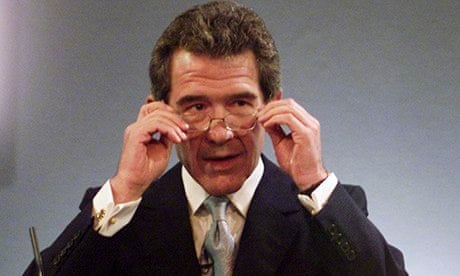Fracking is not going to reduce gas prices in the UK, according to the chairman of the UK's leading shale gas company.
The statement by Lord Browne, one of the most powerful energy figures in Britain, contradicts claims by David Cameron and George Osborne that shale gas exploration could help curb soaring energy bills.
Browne added to the government's ongoing troubles over energy policy by labelling nuclear power as "very, very expensive indeed" and describing the fact that more state subsidies are given to oil and gas than to renewable energy as "like running both the heating and the air conditioning at the same time".
The former chief executive of BP, who now holds a senior government position as lead non-executive director, told an audience at the London School of Economics that climate change was "existentially important", but that without gas the transition to a zero-carbon energy system would never happen.
However, Browne, who is the chairman of fracking company Cuadrilla, said: "I don't know what the contribution of shale gas will be to the energy mix of the UK. We need to drill probably 10-12 wells and test them and it needs to be done as quickly as possible."
"We are part of a well-connected European gas market and, unless it is a gigantic amount of gas, it is not going to have material impact on price," he said.
In August, Cameron said: "If we don't back this technology, we will miss a massive opportunity to help families with their bills … fracking has real potential to drive energy bills down." In July, Osborne said: "This a real chance to get cheaper energy for Britain … a major new energy source that can reduce energy bills."
High-profile protests hampered Cuadrilla's operations at Balcombe in Sussex in the summer but Browne said: "Cuadrilla is not going to frack at Balcombe."
Browne said there was no evidence that fracking itself had caused water pollution in the US, but said there had been "issues to do with the leaking of gas into aquifers as a result of imperfect operations, mainly to do with the cementing of well casings."
In March, the Guardian revealed that Browne and Cuadrilla had been reprimanded in a meeting with the then energy minister Charles Hendry for failing to inform government that earthquakes caused by Cuadrilla's drilling had caused a well casing to deform.
Browne also said: "There have been some bad practices in the US in the disposal of waste water." But he criticised the government for failing to create appropriate regulations for fracking: "We have been behind in trying to create the right regulations."
Ministers rejected the Royal Society's recommendation in June that specific fracking regulations are drawn up, a suggestion Browne backs, arguing that the current patchwork of regulation from the energy department, the Environment Agency, the Health and Safety Executive and planning rules are sufficient.
Browne criticised the UK's fossil fuel subsidies: "In 2011, the UK spent over £4bn supporting the production and consumption of oil and gas, more than they spent to support renewable energy." Across the OECD, he added, $80bn every year is spent supporting production of carbon-based fuels: "It is like running both the heating and the air conditioning at the same time," he said.
On Friday, energy minister Michael Fallon announced that the latest oil and gas licencing round had seen an all-time record number of licences awarded and that independent oil and gas companies would be encouraged to invest and undertake additional exploration.
Browne said nuclear power was one of the safest energy sources available, but said that had come at a cost: "Nuclear power has become very, very expensive indeed."
In October, ministers agreed a deal to pay French state energy company EDF billions of pounds in subsidies if it goes ahead with two new reactors at Hinkley Point in Somerset, a deal that left some analysts "flabbergasted" at the cost. Browne also said the siting of new reactors on the coast when sea level and storm surges are rising was a "big issue" and that they must be made resilient.
Lord Adair Turner, the former chairman of the Financial Services Authority and Committee on Climate Change, introduced Browne's lecture and agreed that the cost projections for nuclear power were "disappointing" compared to a 2008 analysis he led. Turner said that in contrast, solar power costs had fallen "beyond our wildest dreams" by about 80% in five years.
Browne, once known as the "sun king" and who said he is now co-head of the largest private equity renewable energy fund in the world at Riverstone Holdings, said: "Solar is a very good technology and we should use more of it."

Comments (…)
Sign in or create your Guardian account to join the discussion